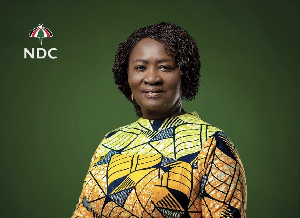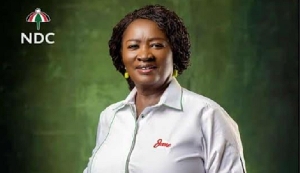 Some of the students at the health event
Some of the students at the health event
More than 500 pupils from selected basic schools in the James Town in Accra on Wednesday received elaborate education on menstruation health management, as part of efforts to empower girls with the required knowledge to safeguard their health.
The collaborative programme between the Becca Health Foundation, a Non-governmental Organisation (NGO), and the United Nations Population Fund (UNFPA), focused with topics such as reproductive health and menstrual hygiene, access to menstrual health products, the proper use of sanitary pads, and menstrual disorders.
The event was graced by Mr Matthew Opoku Prempeh, the Minister of Education, who pledged his Ministry’s support, and the fact that the information being provided would create the needed awareness among pupils, remove all fears, myths and misconceptions, as well as taboos that relegated females to the back during their periods of menstruation.
Ms Rebecca Akosua Acheampomaa Acheampong, popularly known in the Music industry as Becca, who is the founder of the Becca Health Foundation, launched the “I Menstruate Too Project,” to help sustain the education.
Mr Niyi Ojuolape, the UNFPA Country Representative, in his opening remarks, underscored the importance of providing children of both sexes with basic knowledge and education on menstruation health management at an early age, saying it would protect them from the diverse challenges often faced by girls on the unset.
He said the onset of menstruation could result in both physical and psychological trauma in girls, when they have no knowledge or information on the ongoing changes in their bodies, and some girls could get confused, panic in seeing the blood flow; and not knowing the right hygiene products to use, contract urinary tract infections, lose their self-esteem and withdraw from social gatherings and activities.
Mr Ojuolape described menstruation as a natural biological change that occurred in females, signalling puberty, and without which there would be no conception of humans.
He explained that education had become crucial due to fact that girls these days were menstruating as early as between the ages of nine and 10, compared to years gone by when the occurred later.
The UNFPA, he said, would continue to partner with state institutions and civil society in the quest to ensure good sexual and reproductive health for females, especially adolescents in order to sustain the gains made in reducing maternal and child mortality in Ghana.
Ms Freda Prempeh, the Deputy Minister of Gender, Children and Social Protection, said menstrual health is an emerging global health concern because females continue to face various restrictions that violate their rights to physical and psychological wellbeing, hence the need to expand education and create awareness to address these challenges.
She cited some of the constraints as environmental, which included the lack of toilet facilities in schools, affordability of sanitary pads, and cultural norms that made females worthless and appealed to development partners and stakeholders to dedicate more resources to empower girls to see menstruation as an amazing and unique experience.
The Ministry, she said, would also continue to partner with other Ministries in the provision of quality toilet facilities for schools, intensify advocacy with the Ministry of Trade and Industry for a 20 per cent or total removal of import taxes on sanitary pads, as well as sustain the Girls’ Iron-Folate Programme and further intensify public education to break taboos that affected women and girls.
Ms Prempeh called on menstruating adolescents to “stop using rugs,” and encouraged parents to make time to educate their children, both male and females on menstruation and its management, to help boost the morale of girls and build a supportive culture among boys.
The Theatre for Change, an NGO youth drama group, enacted a short play on the challenges of menstrual health to give a pictorial meaning to the information provided by the various speakers, to ensure behavioural change among students and pupils, especially in schools.












